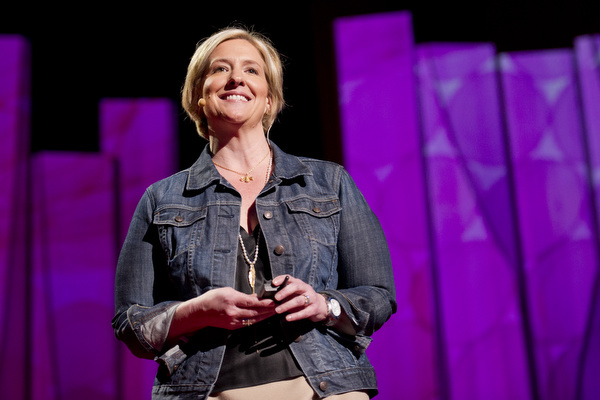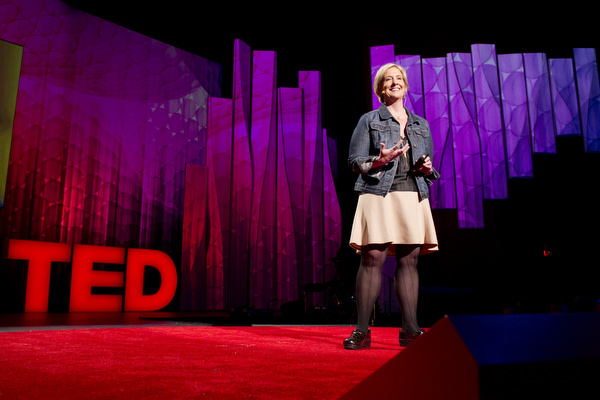Photos: James Duncan Davidson
Brené Brown is an expert on vulnerability who starts off her talk by describing the extraordinary impact of giving a talk in 2010 at TEDxHouston: The Power of Vulnerability. For starters, she says, the day after giving the talk, she woke up in a state of depression that she’d shared details of her own breakdown in front of 500 people, and freaking out about what might happen if, say, 1,000 people watched the video when it was uploaded on YouTube. So far, the talk has been seen by 3.2 million people. It’s been quite a ride. She finds herself being accosted by fans in local stores. She’ s been asked to speak all over the country. And while many of the invitations she’s received have asked her to focus on innovation, creativity and change but perhaps hold off on that vulnerability or shame stuff, Brown wants to talk about it. After all, she says, “vulnerability is the birthplace of innovation, creativity and change.”
Yet the experience also pointed out a harder truth to Brown; it helped her learn a difficult lesson about herself: “As much as I would be frustrated about not getting my work out into the world, there was a part of me trying very hard to engineer staying small,” she confesses. “I was staying right under the radar.” Post TEDx, that was no longer an option.
Brown has continued her work on vulnerability and she shares a few insights now. Firstly, that it is not a weakness. This, she says, is a profoundly dangerous and pervasive myth. Secondly, that in order to understand the relationship between vulnerability and courage, we need to talk about shame. Jungian analysts call shame the “swampland of soul,” a lyrical construct that helps illuminate why it’s important to spend time on the topic, hardly one most of us care to dwell on. But, she says, in order to have a compelling conversation around race, we need to talk about privilege, which is all wrapped up in shame. In order to have a compelling conversation around healthcare, we need to understand that surgeons’ self-worth is stitched up in being all-powerful. All-powerful people don’t need checklists or make mistakes. We need to recognize and understand deep-rooted shame at the heart of any broken system if we are ever to change it.
We also need to accept and embrace the concept of failure, not because failure is a good thing but because it’s a natural part of the path of progress. If you’re failing, at least that means you’re trying — not remaining on the outside of the arena, looking in. And we need to learn to deal with our inner critics, who are so adept at shutting us down when we dare to try.
“Shame is an epidemic in our culture,” she says. “To get out from underneath it, to find out a way back to each other, we have to understand how it affects us, the way we parent, the way we look at each other.” We need to learn to understand what’s going on — and we need to hone our skills with shame’s antidote: empathy. For if the three factors that foster shame the fastest are secrecy, silence and judgment, it cannot survive being doused with empathy. “It can’t survive the two most powerful words to hear when we’re in struggle: ‘me too.'”
So while it might seem like a nice comfortable idea to stand outside the arena, to wait just a little bit longer, until we’re bulletproof or perfect, we need to accept that there’s no time like the present. “Even if you got as perfect as you could, when you got in there, that’s not what we want to see. We want you to go in, we want to be with you and across from you. We just want for ourselves and the people we care about and the people we work with to dare greatly.”


Comments (80)
Pingback: The power of vulnerability « I.M.A.G.E
Pingback: Brené Brown: wishing you love and light – Ordinary Courage | The Considered Kula
Pingback: Musings: Ten Tips For A Saner Life… | Mirth and Motivation
Pingback: Brené Brown: The power of vulnerability « Healthy, Happy Living
Pingback: The power of vulnerability | Jbird
Pingback: The Power of Vulnerability (video) « iNKBLOT
Pingback: Have You No Shame? | catself
Pingback: self-sabotage and shame « underground
Pingback: My TED2012 Experience / Constant Beta
Pingback: no more standing outside the fire | scatterbeams
Pingback: The Courage to Dare Greatly | mind|body|spirit academy
Pingback: DARE GREATLY: On Vulnerability, Shame, and Blogging about my Journe | Michelle Getting Healthy
Pingback: business model innovation design » Bookmarks for March 11th through March 12th
Pingback: Power of Vulnerability | CBrajkovich Ramblings
Pingback: pinboard March 4, 2012 — arghh.net